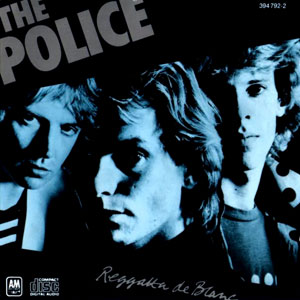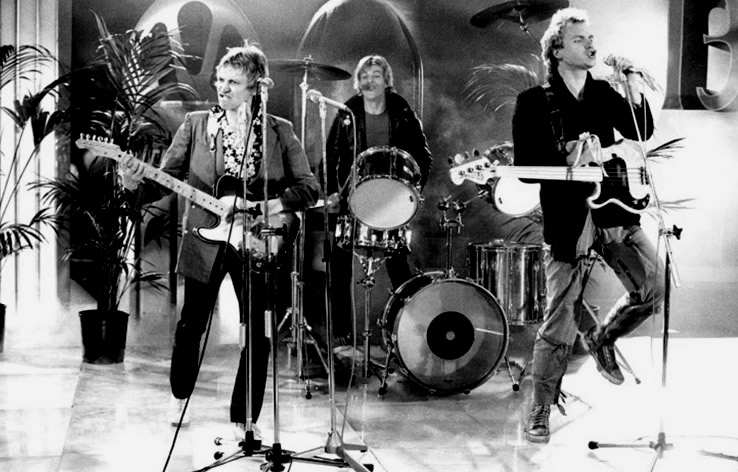Reggatta de Blanc by The Police
 Driven by the strength of two UK number one singles, Reggatta de Blanc helped launch The Police into the commercial stratosphere. Building on the strength of their 1978 debut, Outlandos d’Amour, this second album marked a slight change in the band’s sound, with a more polished and refined production of the trio’s energetic musical performances. The album’s title loosely translates to “white reggae”, a label which aptly describes the core of the group’s signature sound but falls short of touching on the depth of their influences.
Driven by the strength of two UK number one singles, Reggatta de Blanc helped launch The Police into the commercial stratosphere. Building on the strength of their 1978 debut, Outlandos d’Amour, this second album marked a slight change in the band’s sound, with a more polished and refined production of the trio’s energetic musical performances. The album’s title loosely translates to “white reggae”, a label which aptly describes the core of the group’s signature sound but falls short of touching on the depth of their influences.
In 1976, American drummer Stewart Copeland was playing in a British progressive rock band called Curved Air when he met former school teacher turned musician Gordon Sumner, professionally known as Sting. The two jammed and contemplated starting a punk rock band with guitarist Henry Padovani. The trio toured the UK as a supporting act and even recorded a single called “Fall Out” in 1977. Later that year, Copeland and Sting merged with two members of a band called Strontium 90, Mike Howlett and guitarist Andy Summers. About a decade older than the other musicians, Summers had much music industry experience dating back well into the sixties with groups such as Eric Burdon and the Animals. After some live gigs, the Police pared back to a trio with Sting composing original material. Copeland’s older brother, producer Miles Copeland, helped finance the Police’s first album, Outlandos d’Amour, released in 1978. On the strength of the single,”Roxanne”, Miles got the group signed with A&M Records, and the later hit “Can’t Stand Losing” sparked the group’s first tour of the USA.
Like it’s predecessor, Reggatta de Blanc was recorded at Surrey Sound with producer Nigel Gray. The studio was considered too small for a major label act but it was where the group was comfortable recording. With a small budget and limited time for recording, some of the material was re-purposed from previous group projects.
 Reggatta de Blanc by The Police |
|
|---|---|
| Released: October 2, 1979 (A&M) Produced by: Nigel Gray & The Police Recorded: Surrey Sound Studios, Leatherhead, England, February – August 1979 |
|
| Side One | Side Two |
| Message in a Bottle Reggatta de Blanc It’s Alright for You Bring on the Night Deathwish |
Walking on the Moon On Any Other Day The Bed’s Too Big Without You Contact Does Everyone Stare No Time This Time |
| Group Musicians | |
| Sting – Lead Vocals, Bass, Synths Andy Summers – Guitars, Synths Stewart Copeland – Drums, Percussion, Vocals |
|
The opener “Message in a Bottle” was the lead single from the album and subsequently became the group’s first number one hit on the UK Singles chart. This jazzed up reggae with a definitive pop/rock sheen was derived from a riff that Sting had developed while on the first American tour in 1978. The potent and metaphoric lyrics about finding other lonely “castaways” were written during the Surrey studio sessions. The title quasi-instrumental “Reggatta de Blanc” commences with Copeland’s rapid percussive intro, leading to bass rhythm under various delicate guitar textures and vocal chanting and yodeling throughout. Composed collectively by the trio, this evolved from improvisational stage jams during performances of the hit “Can’t Stand Losing You” and the track went on to surprising win a Grammy for Best Rock Instrumental Performance in 1980.
On “It’s Alright for You” the group reached back to their punk roots, albeit with a little more of pop smoothness and variable tempos to make it a dance bop. Sting’s “Bring on the Night” has an extended, dramatic intro before settling into another fine pop/reggae track with some of the lyrics re-purposed from a song he wrote with his former band Last Exit. “Deathwish” follows as an interesting closer to the original first side, using several simple riffs, phrases and beats all fused together for a unique kind of jam.

The textual “Walking on the Moon” was built on Sting’s simple bass riff, Summers’ atmospheric chord strum and very subtle high end percussion by Copeland. Sting said he wrote it as “walking around the room” while intoxicated one night after a concert, remembering the tune the following morning but altering the title. The song became their second British chart topper and a big hit in many other countries but did not chart in the United States. The first of two songs to feature Copeland on lead vocals, “On Any Other Day” is a happy-go-lucky rock track about the crumbling of domestic life. This is followed by the pure reggae track “The Bed’s Too Big Without You”, another track originated by Sting during the Last Exit days. Copeland penned the next two songs, “Contact” which features a crisp and jangly intro riff by Summers trading of with rich synths in the verses, and “Does Everyone Stare”, a tune where Summers plays piano Copeland does his second lead vocals. “No Time This Time” is a strong, punk-like rock closer which actually includes a rare guitar lead. The song was previously released as the B-Side to the “So Lonely” single in November 1978.
Reggatta de Blanc was the first of four consecutive albums by The Police to reach #1 on the UK Album charts. Soon after the group embarked on their first world tour, branching out into places that had been seldom destinations for rock performers like India, Taiwan, Hong Kong, Greece, Egypt and Mexico.
~
Part of Classic Rock Review’s celebration of 1979 albums.




